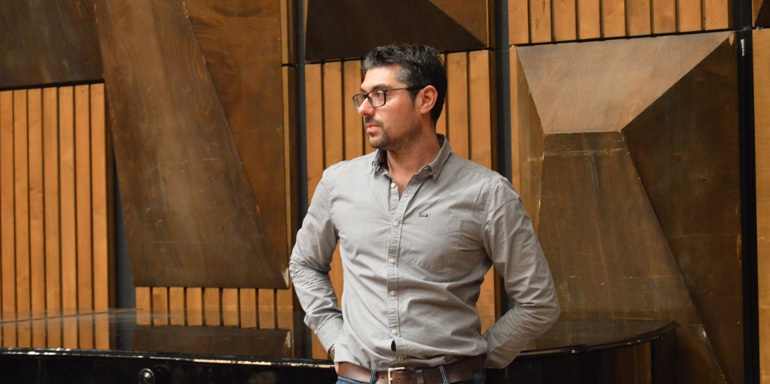
Course Studied: Graduate Diploma in Music
Year of Graduation: 1998
Top Career Highlights:
- Working with various orchestras to record my compositions, including the Moscow Bow Tie Orchestra and the Bratislava Symphony Orchestra
- Having my music performed at the Millennium Stadium with the Welsh National Choir and Katherine Jenkins during the 2005 British and Irish Lions warm-up tour
- Working with both the Prague Royal Philharmonic and Prague Philharmonic Orchestras for the realisation of my music for trailers
A classically-trained composer specialising in orchestral scores for film and TV, Neil Myers has over two decades worth of industry experience. His compositional output has seen him work with the likes of Katherine Jenkins and notable clients including BBC and Sky Sports.
Neil initially studied at Leeds College of Music prior to completing an MA in Composition for Film and Television at the University of West London. We met up with Neil to learn more about his compositional process and approach to time management.
You’ve carved out a successful career which has lasted almost two decades. How do you keep up to date with developments in music technology and preferences in musical style?
The internet is an enabler. It allows composers to keep abreast of ever-changing styles and technologies. I feel lucky that I started composing at a time when advancements in sample libraries and technology were really beginning to take off.
I’ve also found working with a variety of students and graduates has helped me keep up to date with current trends and compositional styles. It’s worth noting that amalgamating styles is not only creatively stimulating but a necessary skill for any media composer. For example - I’m currently working on an EP with an LCoM student, Calum Renaud AKA Kayjee, who has provided rap for a couple of the tracks, something which is new to me.
How do you divide your time between the various projects you’re working on?
Planning your time is essential. Also, keeping in touch and keeping updated with creatives during a production helps massively - particularly when things aren’t perhaps going right. Once you have the music style and themes to match the project brief, the whole process tends to be a lot smoother.
What first attracted you to studying in Leeds? How did studying at LCoM prepare you for your current career?
I lived in Leeds and at the time it was the largest conservatoire in the country - so it was quite a straightforward process of choosing where to study music. Unfortunately back then there were no courses in Film Music available, like there are today. However, the Graduate Diploma in Music I studied explored both classical music and composition, which gave me a solid grounding in the skills I now use every day - I found my time studying thoroughly enjoyable.
You originally trained as a classical composer. How important was this grounding?
Personally I believe it’s incredibly beneficial. A knowledge of music theory and musicology has been essential in many aspects – particularly in terms of composing and understanding musical language. It has also provided me with the ability to discuss ideas and styles with other creatives outside of the music sector without having to use musical terms.
However, sound design skills and an understanding of the various sample/synthetic based elements have become a much more significant part of the overall music production process.
What is your approach to working with each client? Do you receive a brief for every composition created?
Every job is different and you need to approach each one accordingly.
Ideally you receive an initial brief, followed by a meeting where you either have time to demonstrate and discuss some ideas or at very least go through production intention. In my experience the more time you have with a client face-to-face, the better the project will be a result.
How often do you work with professional orchestras in the realisation of your compositions?
Although it’s not possible every time, I do it as much as I can as it’s an incredible experience.
You’ve received many accolades for your work. Could you tell us a little bit about those? For a composer, how important is recognition such as this?
I’ve been very fortunate to have such a variety of opportunities. When working on film and TV you are part of a team - so it’s not just about the music. To get accolades for the overall production is gratifying and rewarding when everyone puts their soul into a project - but it’s not the reason why I do it.
You do some teaching work at a variety of specialist music institutions, including Leeds College of Music. Why do you choose to do this alongside your compositional activity? How do you manage to balance the teaching work with your compositional output?
I really enjoy teaching - it’s great to discuss a range of ideas and see the abilities of students. I’ve worked with several students and graduates over the years who offer some great creative approaches in performances, understanding and techniques.
Balancing teaching and compositional output can be tricky as commissioned work is sporadic and dependent on the nature of the job, is full on. However, some effective planning and having a portable setup definitely helps.
--







